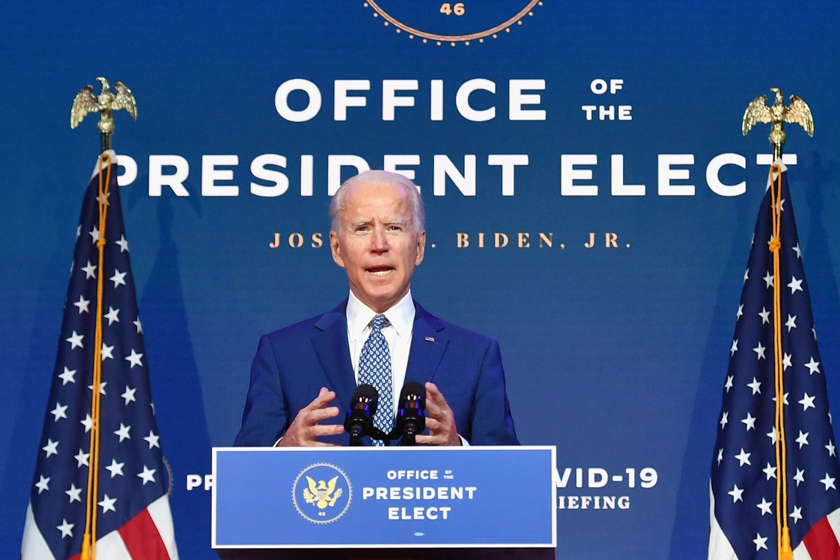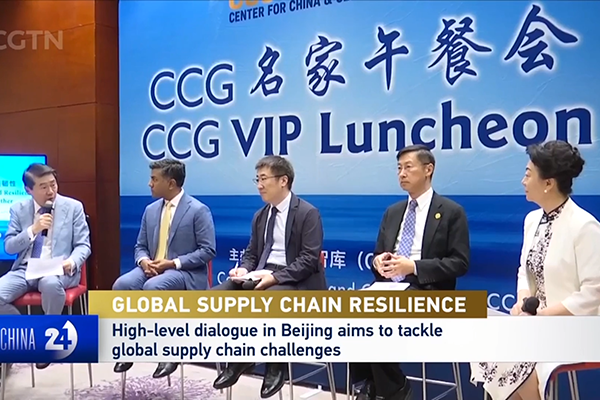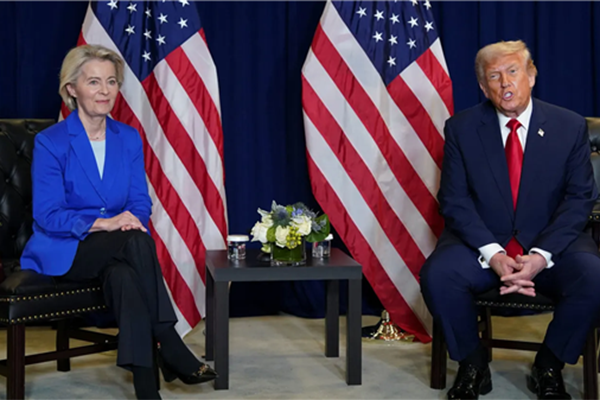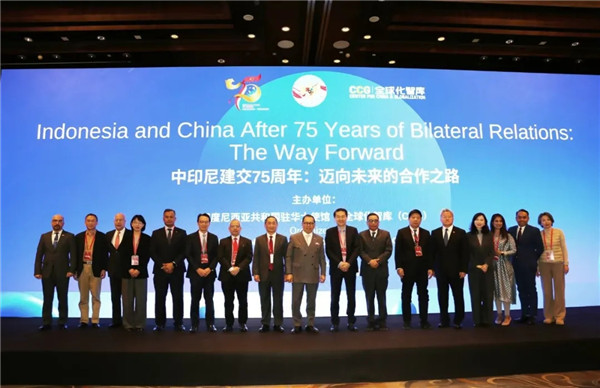[SCMP] China-US relations: how will the Biden effect reshape globalisation?
November 11 , 2020Experts and business executives in China see a US led by a Joe Biden administration as offering positive possibilities
If the US joins back in on global climate, trade and health conversations there will be more opportunities for China and America to collaborate

Experts and businesspeople are considering what a Biden administration will mean to the US-China relationship. Photo: AFP
Soon after Joe Biden was declared the winner of the US presidential election on Saturday, China scholars and observers invoked hopes for changes in trade, investment and globalisation mechanisms that were undermined under the incumbent, President Donald Trump.
China has not yet officially acknowledged Biden’s victory and Beijing has not sent formal congratulations because Trump is seeking to overturn the results by filing lawsuits in different states. However, analysts are discussing the ramifications and possible positive implications for Beijing.
“Under a Biden administration, the US is likely to promote” a host of reversals of Trump actions on the global stage, said Wang Huiyao, president of the Centre for China and Globalisation (CCG) think tank.
Those included reforming the World Health Organization (WHO) and the World Trade Organization, rejoining the Paris Agreement on climate change and seeking to take part in the Comprehensive and Progressive Agreement for Trans-Pacific Partnership, Wang said.
“The moves will provide China and the US, the two important countries in the globalisation process, with more dialogue and cooperation channels concerning energy saving and emission reduction, economic and trade cooperation, epidemic prevention and control, and strengthens global communication and collaboration,” Wang said.
Wang spoke in Beijing on Wednesday, on the sidelines of CCG’s sixth annual China and Globalisation Forum, which was attended by hundreds of academics, diplomats, business executives and former government officials. The South China Morning Post is a strategic media partner of the two-day event.
While overall US policy towards China is unlikely to soften, experts expect Biden will bring predictability and normalcy in world governance, re-engage with international organisations and smooth negotiation and cooperation channels with China.
Biden has not yet been able to properly carry out his transition plans in the way previous presidents-elect have, but he has already committed to rejoining the Paris climate accord and reversing Trump’s decision in April to withdraw from the WHO.
Wang said collaboration between the US and China on combating the Covid-19 pandemic would be a starting point for working together and that resetting China-US relations would influence the globalisation process which had been set back under the Trump administration.
Since 2018, China has suffered from escalating tensions with the US and its allies amid a tariff war, sanctions on China’s major technology companies and accusations of human rights abuses in Xinjiang and Hong Kong.
China longs for a reset in Sino-US relations and attempts to renegotiate the trade deal struck with Trump, viewed in Beijing as being “twisted” in Washington’s favour, advisers to the Chinese government have told the Post.
In the phase one trade deal signed in January, China committed to spending an additional US$200 billion for US goods on top of 2017 levels. However, the latest US data suggests that US exports to China in the phase one deal recorded US$56 billion by the end of September – about 40 per cent of the 2020 target.
Chinese officials consider the purchase target as unrealistically high, according to the sources, but are willing to make concessions in other areas, such as market access and intellectual property protection.
However, US experts said, the outlook for renegotiation did not look encouraging under Biden.
“One can be fairly certain that he will not deliberately seek to destroy the legal and institutional framework of multilateral trade,” said Sourabh Gupta, a senior fellow at the Institute for China-America Studies in Washington.
“However, Biden will simply have to tamp down many of his pro ‘free trade’ views and re-engage trade policy and globalisation via a much more critical lens.”
Da Wei, a professor at the University of International Relations in Beijing, said Biden was likely to revive the globalisation process to some extent – such as returning to a multilateral framework and reducing tariffs – but he would also continue to seek to reshore, or return, industries to the US.
“We’ll probably see Biden’s policies sway between the two directions,” Da said.
While Trump’s call for bringing manufacturing back to the US has met with limited success, the Covid-19 pandemic has highlighted the importance of supply chain security.
US politicians from both the Republican and Democratic camps have underscored the need for the country to reduce reliance on Chinese products, particularly for health security goods such as masks and other protective gear. China currently produces 60 per cent or more of the world’s antibiotics, sedatives, ibuprofen and paracetamol.
The issue has been raised by both Trump and Biden to argue that the global supply chain must be restructured to cut reliance on China, and to accuse Beijing of using its manufacturing prowess to expand its influence. Britain has launched “Project Defend”, which aims to reduce dependence on China with a mix of reshoring and guarantees that supplies pass through friendly countries.
However, even as Covid-19 continues to rage in the US, Gupta said, there was resistance among American pharmaceutical businesses to the idea of relocating or shortening the medical supply chain, except in the case of critical items. The focus, he said, was on ‘de-concentrating’ overseas supply chains to make the supply chain more resilient.
But Qu Hongbin, chief China economist at HSBC, said China was still gaining rather than losing global market share.
“Recent survey results show that the main objective of at least 80 per cent of surveyed multinational corporations in China is to access and serve the domestic market. Therefore, they are unlikely to leave China,” he said.
“Even more important, many of the key factors luring foreign companies into China in the first place remain intact, including a large and growing domestic market, strong industrial network effects, well-established transport and IT infrastructure, and a sizeable pool of skilled labour at a relatively low cost,” he said.
Frank Hammes, chief executive of the Swiss air purification provider IQAir, said: “Supply chains are all about flexibility, reliability and cost. We are constantly making adjustments to optimise our supply chain based on these factors.
“During periods of great demand for our products, as is the case at the moment, reliability is probably one of the most important factors when it comes to our supply chain.
“Apart from a few exceptions, we have found our Chinese suppliers remaining very reliable during this year,” he said, adding that the company was developing new Chinese suppliers “for our local and global requirements”.
“As a Swiss-based brand, we are less affected by geopolitical tensions. As most of the products we purchased from China are components that get integrated into complex products made from many components, we seldom face issues,” he said.
Hammes’ optimism was in stark contrast to the mood of importers of Australian wine and other farm products at the China International Import Expo in Shanghai last week. Concerns are mounting that their business will be upended by growing tensions between Beijing and Canberra after China banned at least seven categories of Australian products including wine, copper and barley, which went into effect on Friday.
“The Covid-19 pandemic did not deal a blow to our business, but the geopolitics will,” an importer said, requiring anonymity because “political issues are sensitive topics in China”.
“Somehow we little ants fell victim to the relations of the elephants,” the person said.
“I hope all these tussles and rivalry can come to an end if Biden becomes the next US president. World trade and business hinge on the US president and his policies, don’t they?”
This article appeared in the South China Morning Post print edition as: Scholars hopeful of better times with Biden team






